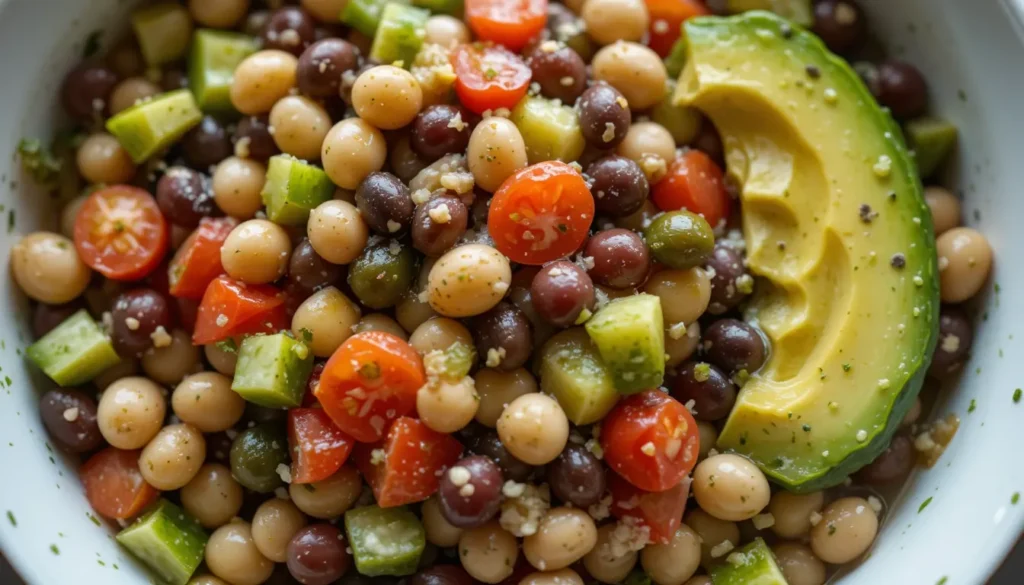Dense bean salad has become a staple in many households around the world, not just because of its rich flavor, but also due to its nutritional benefits. Packed with a variety of beans, vegetables, and healthy fats, this salad offers an energizing and filling meal that caters to many dietary preferences, including vegetarian, vegan, and gluten free. However, there’s a particular reason why this salad is called “dense,” and understanding this term unlocks a deeper appreciation for its composition and health benefits.
In this article, we will explore the origins of the term “dense” in the context of this salad, analyze its nutritional value, and discuss how it fits into modern eating trends. From the types of beans commonly used to the different variations of this dish, we’ll cover everything you need to know about why this salad has earned its unique name.
Table of Contents
What Makes Bean Salad “Dense”?
The Meaning of “Dense” in Food
The term “dense” in the context of dense bean salad refers to both the texture and nutritional composition of the dish. It doesn’t mean the salad is heavy or hard to digest, but rather that it is packed with a variety of nutrient dense ingredients. These ingredients work together to create a meal that is hearty and filling, without being overly rich or calorie laden.
When we talk about food density, we are referring to the amount of nutrients, fiber, and protein per calorie. Dense bean salad, thanks to its combination of beans, vegetables, and healthy fats, is a great example of this concept. Unlike traditional salads that may consist primarily of leafy greens with low caloric value, a dense bean salad is loaded with plant based proteins, fiber, vitamins, and minerals, making it both a filling and nutritious meal.
The Texture of Dense Bean Salad
In addition to its rich nutrients, the texture of dense bean salad is also important to its heaviness. The beans give a firm, slightly chewy feel, while the vegetables add crunch, moisture, and freshness. Healthy fats from ingredients like avocado and olive oil create a creamy texture, balancing the other elements.
This unique combination of firm, crunchy, and creamy textures makes dense bean salad not only satisfying to eat but also versatile in terms of flavor and presentation. Whether served as a side or a main course, its substantial texture and rich composition help to ensure that it can serve as a fulfilling meal on its own.
Key Ingredients in Dense Bean Salad
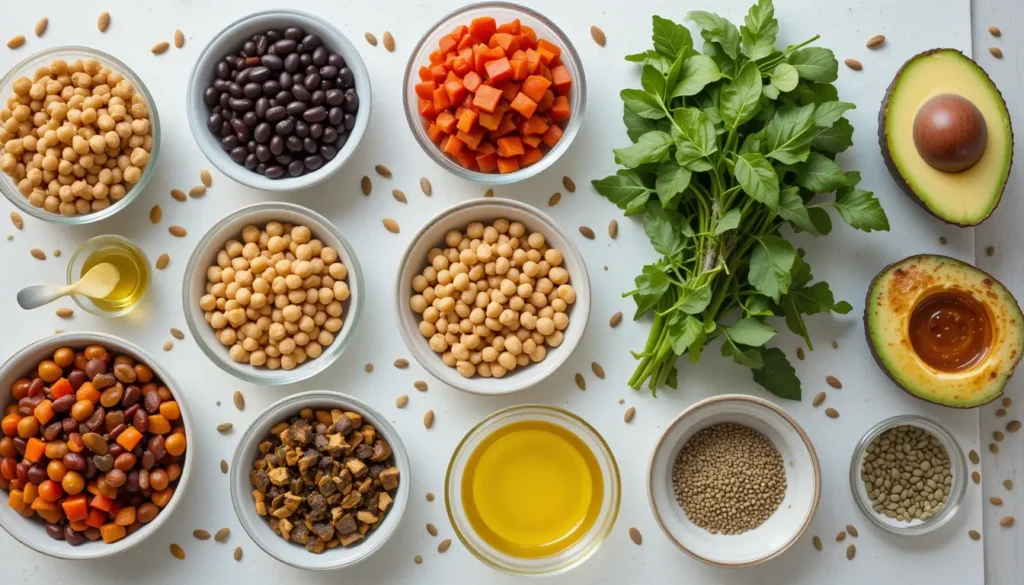
Beans: The Core Component
Beans are the foundational ingredient in dense bean salad. Whether you’re using kidney beans, black beans, chickpeas, or a mix, these legumes provide the salad with a dense source of protein and fiber. Each type of bean has its own unique nutritional profile, but all beans are rich in plant based protein, making them an excellent meat alternative.
Beans also contribute significantly to the salad’s high fiber content, which supports digestive health and aids in satiety. Furthermore, beans are packed with essential minerals such as iron, magnesium, and potassium, which are vital for maintaining healthy bodily functions.
Vegetables and Greens
The addition of fresh vegetables is what gives dense bean salad its vibrant color and nutritional boost. Common vegetables found in this salad include tomatoes, cucumbers, bell peppers, carrots, and onions. These vegetables not only enhance the flavor but also provide a rich array of vitamins and minerals, including vitamins A, C, and K.
Leafy greens, like spinach, kale, or arugula, are often added, enhancing the salad’s nutritional value. These greens are rich in antioxidants and important nutrients that support heart health, immune function, and overall well being.
Healthy Fats and Dressings
Another key part of dense bean salad is healthy fats, which make it more satisfying. Fats from avocados, olive oil, and seeds are rich in nutrients and give the dish a creamy texture. These fats also support heart health and help the body absorb vitamins A, D, E, and K.
The dressing, typically made from olive oil, vinegar, and herbs, further enhances the flavor of the salad while also adding healthy fats. By incorporating a simple homemade dressing, you can control the amount of added sugar and unhealthy oils, ensuring that your salad remains both delicious and nutritious.
For a detailed guide on how to prepare this dish, check out our Dense Bean Salad Recipe, which perfectly complements the flavors discussed.
Nutritional Benefits of Dense Bean Salad
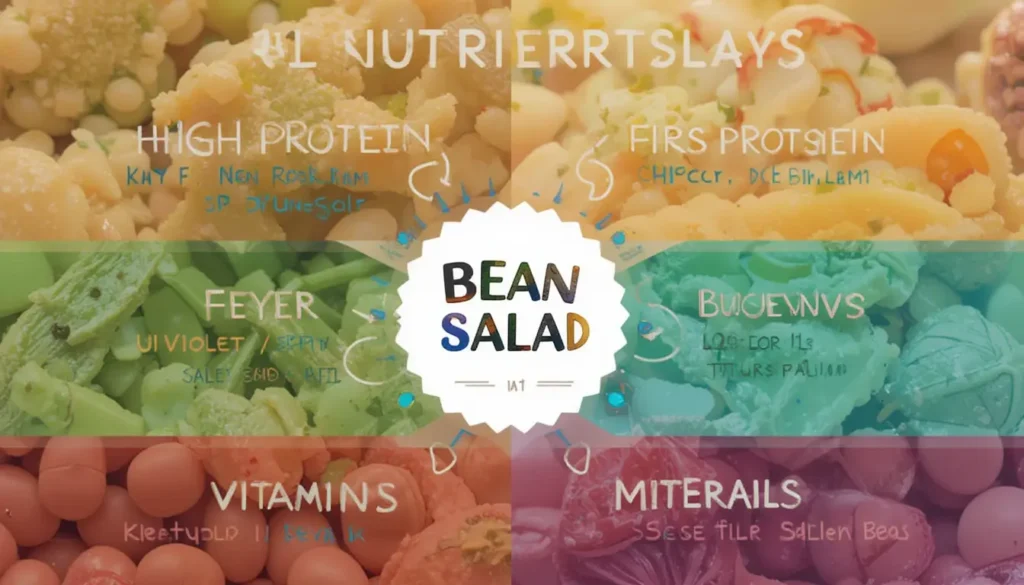
High Protein Content
Dense bean salad is an excellent source of plant based protein. Beans are packed with protein, and a typical serving of a dense bean salad can provide anywhere from 7 to 15 grams of protein, depending on the type and amount of beans used. Protein is essential for muscle repair, immune function, and energy production. For vegetarians and vegans, this makes dense bean salad an essential meal component.
Rich in Fiber
Another significant benefit of dense bean salad is its fiber content. Beans, vegetables, and greens provide high fiber, which promotes digestive health and prevents constipation. Fiber supports weight management.
Fiber also stabilizes blood sugar levels, benefiting people with diabetes or those needing steady energy throughout the day.
Packed with Essential Nutrients
This healthy salad is packed with important vitamins and minerals, like iron, potassium, magnesium, folate, and vitamin C. These nutrients help the body in many ways, such as keeping blood pressure healthy, strengthening bones, boosting immunity, and aiding in wound healing. By eating a nutrient rich salad, you make sure your body gets a wide range of essential nutrients in one meal.
How Dense Bean Salad Supports Health Goals
Heart Health and Cholesterol Control
Dense bean salad is a heart healthy dish due to its high fiber and antioxidant content. Studies have shown that consuming more fiber helps reduce bad cholesterol (LDL) levels, which in turn lowers the risk of cardiovascular disease. The healthy fats found in the dressing and avocado also help maintain healthy cholesterol levels, further supporting heart health.
Weight Management and Digestion
The combination of protein, fiber, and healthy fats in dense bean salad helps promote a feeling of fullness and satiety. This makes it an excellent choice for weight management, as it can prevent overeating by keeping you satisfied for longer periods. The fiber content also aids in digestion and regular bowel movements, contributing to overall digestive health.
Environmental Benefits & Customization of Dense Bean Salad
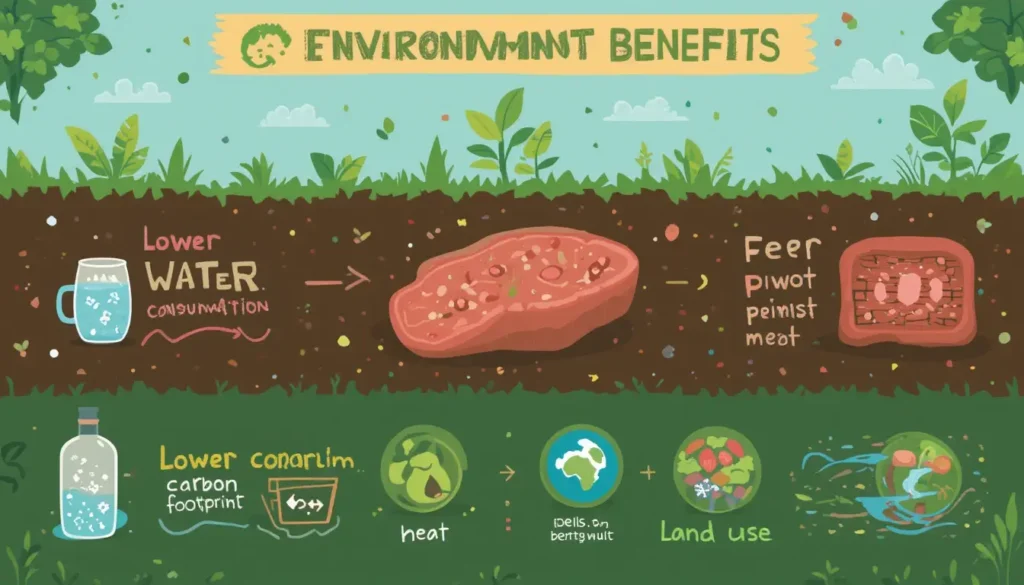
The Environmental Benefits
Dense bean salad isn’t just great for your health—it also contributes to a more sustainable food system. As environmental awareness grows, many people seek ways to reduce their carbon footprint. Plant-based foods like beans offer a simple, effective solution.
Sustainable Protein Source
Beans are considered one of the most eco friendly sources of protein. Unlike animal based proteins, beans need much less water, land, and energy to grow. For example, producing a pound of beef uses far more resources than growing a pound of beans. Beans also have a smaller carbon footprint, making them a better choice for the environment. By replacing animal protein with plant based proteins, you reduce your environmental impact without sacrificing taste or nutrition.
Minimizing Food Waste
Another environmental benefit of dense bean salad is its ability to help reduce food waste. Beans, when dried and stored properly, have a long shelf life, making them an excellent pantry staple. You can stock beans for a long time without worrying about spoilage, reducing food waste. Leftover vegetables and beans can be used in a new batch of dense bean salad, minimizing waste and maximizing ingredients.
By using leftover beans and vegetables, you help create a food system that supports the environment and reduces waste.
Customization Options
One of the best things about dense bean salad is how versatile it is. Whether you’re making it for a family meal, a potluck, or a quick lunch, you can easily adjust the ingredients to fit your tastes or dietary needs.
Adapting the Salad for Dietary Needs
Dense bean salad can easily be adapted for various dietary restrictions, ensuring that everyone can enjoy a nutrient dense meal.
- Vegan & Vegetarian: The salad is naturally vegan and vegetarian friendly due to its plant based ingredients. Simply ensure that the dressing doesn’t contain any dairy or animal products. Avocado is an excellent substitute for creamy textures, and you can even add tofu or tempeh for additional protein.
- Gluten-Free: Most ingredients in a dense bean salad are gluten free. Just be mindful of the dressing ingredients or any potential cross contamination if you’re making the salad for someone with celiac disease. Always use gluten free dressing and double check other packaged ingredients.
- Low-Carb/Keto: For those on a low carb or keto diet, swap high carb beans like chickpeas or kidney beans for low carb alternatives such as black soybeans or edamame. Be sure to add healthy fats, like olive oil, avocado, and seeds, to meet your fat intake goals.
Creative Variations: Ingredients to Try
The basic variation includes beans, vegetables, and healthy fats. It’s easy to add creative ingredients. These additions bring new flavors, textures, and nutrients to the dish.
- Roasted Vegetables: Adding roasted vegetables, such as sweet potatoes, carrots, or cauliflower, gives the salad a smoky, caramelized flavor that balances the freshness of raw vegetables.
- Whole Grains: Incorporating grains like quinoa, farro, or brown rice adds a chewy texture and additional fiber to the salad. These grains also help make the salad more filling.
- Seeds and Nuts: Pumpkin seeds, sunflower seeds, or toasted almonds add a satisfying crunch and healthy fats. They also provide extra protein and minerals like zinc and magnesium.
- Herbs and Spices: Fresh herbs like cilantro, parsley, or mint bring vibrant flavors, while spices like cumin, chili powder, or paprika can introduce warmth and depth to the salad.
- Fruits: To add a sweet contrast to the savory elements, try including fruits like pomegranate seeds, apple slices, or orange segments. These fruits provide natural sweetness and antioxidants.
The options are truly endless when it comes to creating your perfect version of this healthy salad.
Dense Bean Salad in Modern Eating Trends
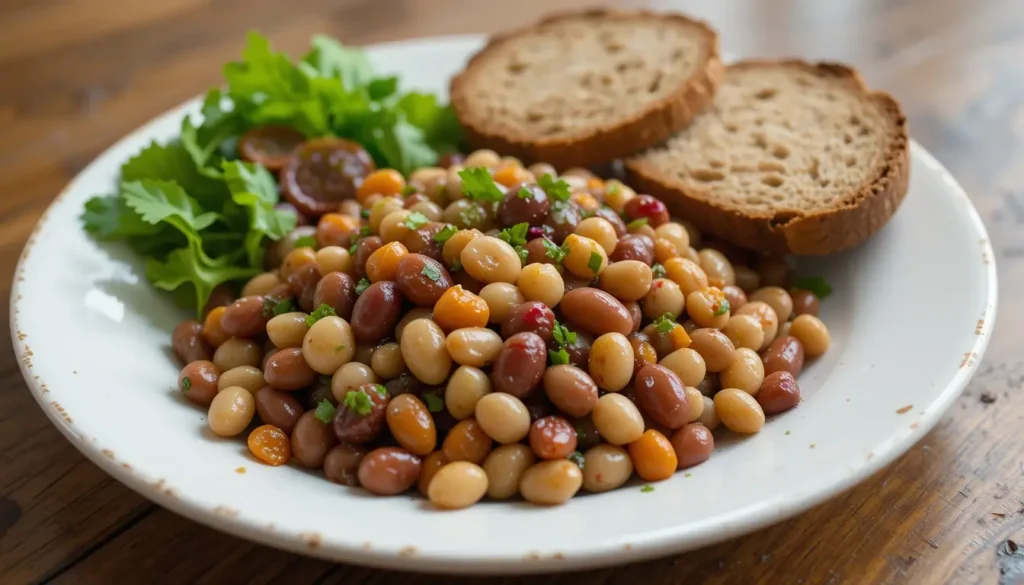
The Rise of Plant-Based Eating
In recent years, plant based eating has gained tremendous popularity. More people are adopting vegetarian, vegan, or flexitarian diets. As a result, foods like dense bean salad have become central to these eating habits. Beans, rich in plant-based protein, effectively replace animal products in the diet. Their dense texture makes them an ideal substitute for meat in salads, stews, and bowls, providing the heartiness many seek from animal proteins.
The growing demand for plant based protein has spurred innovation in the food industry. Companies are creating new ways to incorporate beans and legumes into everyday meals. From bean based snacks to ready to eat salad kits, the versatility of beans continues to shape modern eating trends.
Clean Eating and Whole Foods
Another key trend that aligns with dense bean salad is clean eating. Clean eating focuses on eating whole, minimally processed foods that are full of nutrients and free from artificial additives. This salad fits perfectly into this trend because it uses whole, unprocessed ingredients like beans, fresh vegetables, and healthy fats. The goal is to nourish the body with clean, healthy foods that provide the best nutrition.
Dense bean salad supports the clean eating movement by being made from scratch with fresh, whole ingredients. The movement advocates eating as close to nature as possible. This salad shows that nutritious food doesn’t have to be complicated or time consuming to prepare.
Conclusion
Dense bean salad’s popularity is no accident. With its combination of hearty beans, vibrant vegetables, and healthy fats, it’s a meal that’s both filling and nourishing. The term “dense” refers not only to its rich texture but also to its ability to provide a complete and satisfying meal packed with protein, fiber, and essential nutrients.
This salad fits perfectly into modern eating trends, whether you’re looking for a plant based protein source, aiming to eat clean, or simply seeking a nutritious, easy to make dish. Its versatility allows for endless customization, making it adaptable to a wide range of dietary preferences and tastes.
As more people embrace plant-based meals for health and environmental benefits, dense bean salad will remain a favorite. Whether you’re a seasoned vegetarian or just seeking a nutritious meal, this salad is here to stay.
Print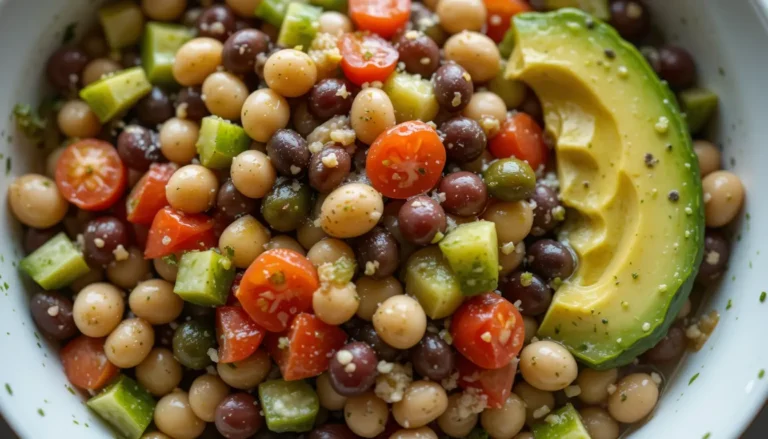
Dense Bean Salad
A protein-packed, nutrient-dense bean salad with a medley of beans, crisp veggies, and a tangy, herb-infused dressing—perfect for any meal!
- Total Time: 20 minutes
- Yield: 4 servings 1x
Ingredients
- 1 can (15 oz) black beans, drained and rinsed
- 1 can (15 oz) chickpeas, drained and rinsed
- 1 can (15 oz) kidney beans, drained and rinsed
- ½ cup red bell pepper, diced
- ½ cup cucumber, diced
- ¼ cup red onion, finely chopped
- ¼ cup fresh parsley, chopped
- ¼ cup feta cheese (optional)
For the Dressing:
- ¼ cup olive oil
- 2 tbsp red wine vinegar
- 1 tbsp lemon juice
- 1 tsp Dijon mustard
- ½ tsp garlic powder
- ½ tsp dried oregano
- Salt & pepper to taste
Instructions
- In a large bowl, combine black beans, chickpeas, kidney beans, red bell pepper, cucumber, red onion, and parsley.
- In a small bowl, whisk together olive oil, red wine vinegar, lemon juice, Dijon mustard, garlic powder, oregano, salt, and pepper.
- Pour dressing over the salad and toss until well coated.
- Let sit for at least 15 minutes to allow flavors to blend.
- Sprinkle with feta cheese (if using) and serve chilled or at room temperature.
- Prep Time: 10 Min
- Cook Time: 10 Min
Nutrition
- Serving Size: 1
- Calories: 280

